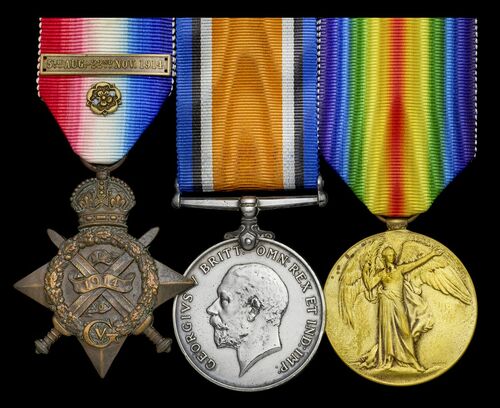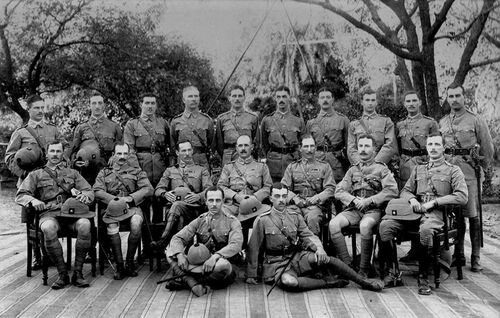Auction: 24002 - Orders, Decorations and Medals
Lot: 165
The campaign group of three awarded to Major J. Batchelor, Worcestershire Regiment, who was wounded by a shell on 3 November 1914 near Ypres
1914 Star, clasp (Hon: Lt: & Q.M. J. Batchelor. Worc: R.); British War and Victory Medals (Q. M. & Lieut. J. Batchelor), light contact marks good very fine (3)
James Batchelor was born at Alverslake, near Gosport in May 1866 and enlisted into the Worcestershire Regiment at Portsmouth on 21 May 1886. Previously he had been a member of the 3rd Battalion, Hampshire Volunteers. On enlistment, he gave his trade as engineer and was born in the parish of. His father was living at The Hasler Tavern, Hasler Street, Gosport - one would assume that he was a publican.
He was posted as Private to the 2nd Battalion, serving at home. His demeanour and personality must have suited army life and it seems he settled down quickly, gaining his 2nd Class Certificate of Education on 14 December 1886 - he began to receive steady promotion. On 1 June 1887, he was promoted Lance Corporal, with a further promotion to Corporal coming on 1 August 1887.
Whilst serving in Portsmouth, he was not without ailment and on 14 June I887, was admitted to hospital with slight blistering caused by ringworm. The area, in the true traditions of a sea faring town, was not without its temptations for on 10 September 1888, Batchelor was admitted to hospital for 20 days with gonorrhoea and again an 9 October for 59 days with 'iritis' - the cause being 'doubtful', with severe blistering.
On 29 April 1889, Batchelor was posted to Limerick. On 21 February 1890, he was posted to the 1st Battalion and travelled in the Crocodile to lndia, arriving on 20 March, being posted initially to Poona. He remained in the East lndies for six long years, seeing promotion to Sergeant on 28 April 1890 and Colour-Sergeant on 25 May 1894. He had received his 2nd Good Conduct badge on 21 May 1892 and on 5 September 1893, had elected to continue in the Army to complete 10 years with the Colours'. Whilst in lndia, Batchelor, like so many, suffered from the climatic conditions He was hospitalised on 31 January 1893 for 5 days with "mild ague" and again on 4 December 1894 for 8 days. Whilst in lndia, romance blossomed and he married Marie Ellen Johnson at the Free Church, Silabuldi, Nagjur on 15 March 1894 - his papers do not record the couple as producing any children. He became a qualified musketry instructor on 14 September 1895 and gained his 1st Class Certificate of Education on 31 March 1896. On 17 August 1896, still overseas in Aden, he again elected to remain in service in order to complete 21 years, having been declared medically fit to do so on 15 August. Batchelor returned to the U.K. on 13 November 1896. On 8 March 1897, he was posted to the Depot at Norton Barracks, Worcester, where on 21 May 1898, he received his third Good Conduct Badge. During his time here, he suffered from "Traumatic lritis" and was hospitalised for a week.
On 23 February 1900 he was posted to the 4th Battalion and promoted to Quartermaster-Sergeant. His services seemed required at home, for he did not fight in the Boer War in South Africa. Instead, he served at Aldershot and Chatham.
On 18 February 1902 with the 4th Battalion, he went overseas again, this time to Bermuda and sailed in the S.S. Harlech Castle. ln Bermuda, he developed a sometimes fatal disease and on 18 July 1902, was hospitalised with Enteric Fever for 44 days, being described as "very severe, but short attack".
On 5 December 1903, the Battalion set sail for Barbados on the S.S. Dunera, arriving there on the 18th. Here, Batchelor was promoted to Sergeant Major on 3 December 1904.
On 13 November 1905, the troops received another posting - this time to Malta. They sailed on the S.S. Yaria and arrived there on 2 December. Here they remained until setting sail again, this time on the S.S. Dilwara to Egypt on 8 May 1906, arriving at Alexandria on 11 May. They returned to Malta again on 9 June. Here, he was granted permission to continue in service past 21 years on 26 September 1906. In November 1908 Sgt. Major Batchelor, still with the 4th Battalion, moved to lndia once again and remained there until 5 November 1909, where it seems he returned to the U.K. and was promoted Hon. Lieutenant and Quartermaster.
With the outbreak of the Great War, on 13 August 1914 he was present with the 2nd Battalion, Worcestershire Regiment when they left Southampton on the transport ships Lake Michigan and Herschel and landed at Boulogne in the afternoon of the 14th, as part of the British Expeditionary Force sent to stem the tide of the German assault on France and the Low Countries.
For the first few days, the Battalion took time in moving to the front and on 23 August, the Battalion began preparing trenches on a slight rise that overlooked Mons. No sooner had they dug in, expecting to be attacked at any moment, they were given orders to move during the night to Frameries and were successfully entrenched by dawn on the 24th. Here they came under heavy shell fire and experienced their first casualties. The Battalion were then engaged in the retreat from Mons in the face of a stiffening German assault; the battle of the Marne and the advance to the Aisne.
The Battalion was moved north west of Ypres, near Langemarck in mid October and were hotly engaged in the battles that surrounded this area: also that of Polygon Wood, where they closed with the enemy in a vicious hand to hand bayonet fight amongst the trees. Soon after this was to be the battle that would catapult the Worcestershire Regiment, in particular the 2nd Battalion, into military stardom - the famous bayonet charge over the shell and bullet strewn flat ground to Gheluvelt chateau an 31 October. Although obviously present with his Battalion at the time of the famous action at Gheluvelt, it would appear that he did not take a part in the actual charge over the open ground, as he is not recorded, as one of the officers, who actually led their men during this action.
The Battalion suffered heavily, losing about a third of their already depleted strength, but succeeded in plugging a gap in the British line that would have undoubtedly given the Germans access to the channel ports and would have probably secured total victory for the enemy and changed the boundaries of Europe forever.
After this action, they were engaged in the construction of a rear system of defences and came under intermittent shell fire. It was here that the War Diary records that between 3-5 November, the casualites amounted to one death and three wounded. Batchelor's papers record that on 3 November 1914, near Ypres '...he was injured by the explosion of a high explosive shell, which caused a mild degree of concussion of the brain.'
He left his Battalion on 4 November and was transported to Boulogne, where he boarded the S.S. Grianaig for Southampton on the 6th. He arrived the following day. He was given leave from 21 November to 4 December. A medical board sat on 2 February 1915 and assessed that he was now fit for home service, having sufficiently recovered from severe concussion, which was not viewed as permanent. On 1 April 1915 at Evelyn House, Salisbury, a second medical board recorded, '...still suffering from the effects of the concussion caused by the shell exploding. There is still some neurasthenia present in his condition.'
The Board determined that Batchelor was not fit for active service and was unfit for duty for a further four months, but would eventually be fit for home service. Although the date is unknown, Batchelor was finally attached to the Army Service Corps as an Instructor in Catering at Salisbury and served in this capacity for the remainder of the war. He was still serving in June 1919 and for his services was promoted from Captain and Quartermaster to Major on 3 June.
Batchelor, at the point of serving 18 years with the Regiment, should have been issued with his L.S. & G.C. Medal in 1904 - there being no obvious reason in his service papers why this shouldn't have been the case. However, his service papers do not record him ever being issued with it, nor does the medal roll - for some unknown reason, it appears he was not entitled to it.
His name is mentioned amongst the Officers and men of the 2nd Battalion who were part of the British Expeditionary Force embarking for France in August 1914, and whose names are recorded on a number of parchments in Worcester Cathedral. After retiring, Batchelor worked hard in the interests of the British Legion and was Vice President of the Aldershot Branch. His wife Marie died in 1941 and upon her death, he moved to St. Ives, Cornwall where he continued active work with the Legion. Batchelor was one of three brothers, all of whom after long service in the ranks, were given Quartermaster's commissions. He died on 5 July 1946 and such was his love of the sea that he asked for a sea burial.
His obituary appeared in the October 1946 issue of the Regimental Journal - its closing comment was:
'Of distinguished soldierly appearance, he was a genial Companion, a loyal comrade and friend and was very proud of the Old Regiment. God rest him.'
Subject to 20% VAT on Buyer’s Premium. For more information please view Terms and Conditions for Buyers.
Estimate
£500 to £600
Starting price
£500







